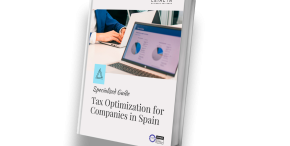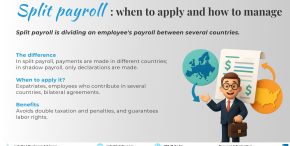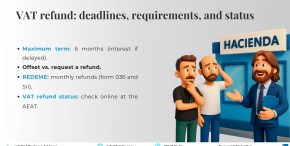
Today, the European single market allows companies to trade without tariff barriers. But for this to work and to be able to fully benefit from this tax environment, certain requirements must be met. One of the most relevant is the registration of intra-Community operators, also known as registration in the ROI (Register of Intra-Community Operators).
In this article we will be able to see what the ROI is, who is obliged to register, what the registration process is like and what risks are involved in operating without registering correctly.
How foreign companies can register with the ROI in Spain
Index of contents
Firstly, when a foreign company wants to operate in Spain and make purchases or sales with other EU Member States, it must register with the ROI through the Tax Agency. This is an essential step in order to be able to issue or receive VAT-exempt invoices for intra-Community transactions.
For this to happen, it is necessary for the company to obtain a Spanish VAT number, regardless of whether it is physically established in Spain or not. In addition, it must appoint a tax representative domiciled in Spanish territory and justify that its activity involves real transactions with companies in the European Union.
Such registration is not automatic. The tax authorities must analyse the documentation provided to verify that there is an economic activity and that the tax obligations derived from this activity will be fulfilled. Only if the case is favourable will registration as an intra-Community operator be granted, thus activating the intra-Community VAT number.
What is the ROI and why is it essential for VAT-exempt trade in the EU
As seen above, the Register of Intra-Community Operators (ROI) is a database managed by the Tax Agency in which companies that carry out commercial operations with other EU countries must register. Registration allows traders to be identified for VAT purposes and ensures that European tax rules are correctly applied.
It should not be forgotten that ROI registration is essential to be able to operate legally with other European companies without applying VAT at source, since intra-Community transactions are generally exempt from VAT if both parties are registered as traders.
Therefore, ROI registration is not only a formal requirement, but also a fundamental operational condition.
ROI vs VIES: what’s the difference?
It is true that ROI and VIES are often used synonymously, but ROI and VIES are not exactly the same. Their most notable differences can be seen in the following:
- ROI is the national register managed by the Spanish Tax Agency.
- The VIES (VAT Information Exchange System) is the European database in which the intra-Community operators of all the Member States appear.
| Feature | ROI (Register of Intra-Community Operators) | VIES (VAT Information Exchange System) |
|---|---|---|
| What is it? | National register managed by the Tax Agency | European database of intra-Community operators |
| Who manages it | Spanish Tax Agency (AEAT) | European Commission / Network of tax administrations |
| Main function | Authorise intra-Community operations without VAT | Verify validity of the VAT-ID number in other EU countries |
| Is it compulsory to appear in both? | Yes, to operate legally and benefit from exemptions | Yes, inclusion in the VIES is activated when registering in ROI |
| Public visibility | Not public (internal AEAT management) | Online public consultation for third parties |
When a company registers with the ROI, its details are automatically communicated to the VIES system, allowing any European company to verify its validity as an intra-Community trader.
For example, if a company is going to buy products in Germany or provide services to a company in France, it must first register with the ROI in order to operate legally and benefit from VAT exemption on these transactions.
Who must register with the ROI in Spain?
There are a series of requirements, but, principally, all companies or self-employed persons, whether resident or non-resident, who are going to carry out the following must apply for registration as an intra-Community operator:
- Intra-Community acquisitions of goods or services.
- Intra-Community deliveries of goods to companies or professionals in other EU countries.
- Triangular transactions or other transactions subject to the special intra-Community VAT regime.
Registration is also compulsory if you wish to apply reverse charge on certain international transactions. Even if the transactions do not occur frequently, prior registration is necessary in order to be able to operate legally under this tax regime.
Requirements to register as an intra-Community operator in Spain
Before starting the registration process for intra-Community operators, a foreign company must comply with certain legal and fiscal requirements. Among the most important of these are:
- Obtain a Spanish NIF: Non-resident companies must apply for a tax identification number through the Tax Agency.
- Proving a real economic activity: It is essential to justify that the company has an active economic activity and that there are commercial relations with other European entities.
Demonstrate intention to carry out intra-Community operations: It is advisable to provide pro forma invoices, contracts, budgets or orders to support the application
Tax representation in Spain: who needs it and why
Furthermore, in the case of foreign companies without a permanent establishment in Spain, it is compulsory to appoint a tax representative to act on behalf of the entity before the Tax Agency. This representative must reside in Spain and will be responsible for compliance with the company’s tax obligations in Spanish territory.
Fiscal representation is an essential requirement to obtain registration in the ROI and, therefore, to be able to operate legally as an intra-Community operator.
ROI registration process in Spain: step-by-step guide
The process of registering with the ROI is carried out at the Tax Agency by filing form 036, which is the form used to report the start, modification or cessation of a taxpayer’s economic activity.
Step 1: Filing form 036 with the Tax Agency
All companies must file form 036 by ticking the box corresponding to registration with the ROI (box 582). The form must also indicate the applicable VAT regime and, where applicable, the designation of the tax representative.
The form may be filed electronically, if you have a valid digital certificate, or through an authorised representative.
Step 2: Provide proof of economic activity
It should be noted that, together with form 036, the company must provide documentation that accredits the existence and real activity of the entity, such as:
- Deeds of incorporation.
- Certificate of registration in the commercial register of the country of origin.
- Documents accrediting the intention to carry out intra-Community operations (budgets, contracts, commercial correspondence).
The AEAT may request additional information if it considers that the documentation is insufficient to assess the application.
How long does it take to get ROI/VIES registration?
The resolution period varies, but it is usual for the Tax Agency to resolve the application within 15 to 30 working days from the submission of the complete documentation. In some cases, registration may be delayed if additional information is required or if there are doubts about the economic activity.
Once the application has been approved, the company will appear in the VIES register and will be able to operate as an intra-Community operator.
What are the risks of trading without ROI registration?
Carrying out intra-Community transactions without being registered with the ROI can have significant tax consequences:
- Invoices issued without being registered will be considered incorrect and will have to include VAT, thus losing the exemption.
- Financial penalties may be imposed for non-compliance with tax obligations.
- The company could face inspections or administrative blockades by the AEAT.
Therefore, it is essential to register ROI before issuing or receiving any intra-Community invoice.
How Leialta helps foreign companies with ROI and VAT compliance
At LEIALTA we help foreign companies to set up in Spain quickly and safely. We take care of procedures such as obtaining the NIF, advice and registration with the ROI, tax representation before the Tax Agency and, of course, our comprehensive consultancy services.
We have a team specialised in the internationalisation of companies and intra-Community operations, ready to accompany you throughout the process of implementation and growth in the Spanish market.




